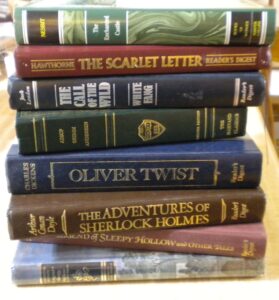
The Rise and Rise of the Classic Novel
Recent years have seen the rise and rise of the classic novel, books that have stood the test of time and are known for their enduring themes, timeless characters, and universal messages. We often share consciousness of these timeless stories having read (or claiming to have read) the works of literary luminaries such as William Shakespeare, Jane Austen, Charles Dickens, and Mark Twain. And we are now looking beyond the Western canon to classics such as The Tale of Genji, the 11th century Japanese classic by Murasaki Shikib. Arguably we need classics more than ever because they force us to slow down, to ponder complex, nuanced and often profound insights into the human condition. In 2025, the classic novel may indeed provide a necessary counterpoint to our fast-paced world dominated by social media and AI. At Fort Street High we have been promoting classic novels… and students are responding.
Students ask why they should read classic literature. There are many reasons. While it may take longer to immerse oneself in classic novels due to more challenging vocabulary and more complex structures, classic novels are often set in different time periods and provide us with a glimpse into the lives of people from different cultures and backgrounds. By reading classics, we are thus able to step outside our own lives and hopefully empathise and feel compassion for others. The classic has also been tested by time and has endured, teaching us about universal issues such as love, betrayal, grief and redemption. Most significantly, classic literature offers a lens to view our own lives, to assess our place in our own world and to recognise that individuals can work through their struggles. With the increase of translated texts, it’s pleasing to witness the expansion of the traditional literary canon beyond predominantly Western classics by providing access to stories from Asian, Middle Eastern, and Latin American authors, among others. International literary prizes and increasing sales of translated fiction means that we are reading across cultural borders which can only be a positive trend. At Fort Street High Library we are keen to expand our cross-cultural collection.
The reading of classics has been noted to have enjoyed a peak during the pandemic years as we turned to our books sitting on our dusty bookshelves. Publications such as The Guardian noted that sales of classics such War and Peace, Don Quixote and Middlemarch were booming during Covid and the appeal of a seriously long read had never been more alluring. “We were expecting possibly to see a spike in comfort reads, like cosy crime or light comic novels. Instead, it seems that readers have been inspired in lockdown to tackle the great literary monuments – the books that maybe they’d always intended to read, but never before now had the time to embark on,” remarked Penguin Classics editorial director Jess Harrison (The Guardian, 28/10/2020). Reading during the pandemic also highlighted how books and their meanings change. Novels that we think of as settled in their significance acquire new meaning as they are read under shifting conditions. For example, Jane Eyre has been cited as a novel that many readers picked up during lockdown. Suddenly, this classic seemed to be a novel about a woman locked in small rooms living through a cholera epidemic. Many connected with the ‘small spaces’ within which the action of the novel plays out.
In current times, perhaps it is even more urgent that we all return to, or visit for the first time, classics such as Orwell’s 1984. While published in 1948, it is such a timely reminder to sit up and pay attention to encroaching restraints on free speech. Big Brother is watching more than ever. While ‘War is Peace. Freedom is Slavery. Ignorance is Strength’ are the watchwords of the tyrannical regime in Orwell’s cautionary tale, this classic novel mirrors too well aspects of today’s global political landscape. We need to read classics to heed the warnings of the past and to encourage us to challenge and question the way that we may live in our own world. We thus want our students to read broadly and to read classics as part of their reading smorgasbord, to make connections to their own lives. As stated, we need classics to force us to slow down, to ponder nuanced and often profound insights into our shared humanity. And once hooked, the classics offer brilliant page turning stories- and that, ultimately, is why we read.


